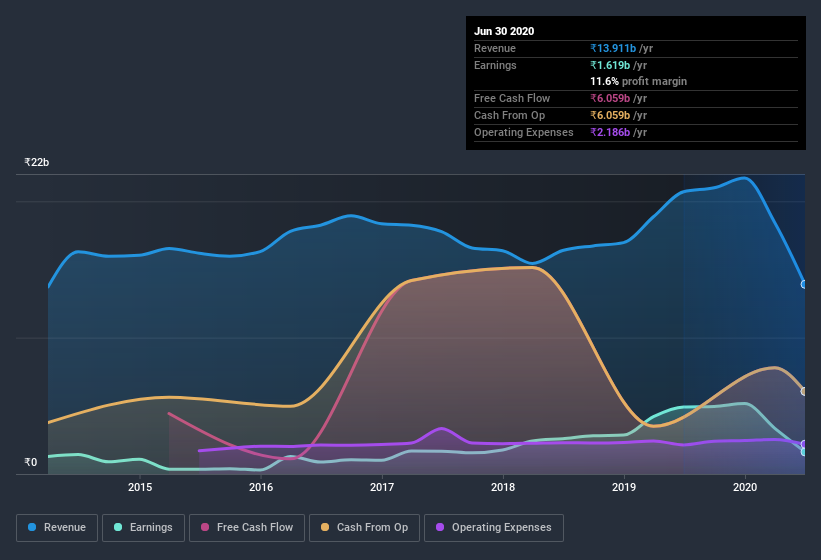- India
- /
- Real Estate
- /
- NSEI:PHOENIXLTD
Are Phoenix Mills's (NSE:PHOENIXLTD) Statutory Earnings A Good Guide To Its Underlying Profitability?

Many investors consider it preferable to invest in profitable companies over unprofitable ones, because profitability suggests a business is sustainable. That said, the current statutory profit is not always a good guide to a company's underlying profitability. In this article, we'll look at how useful this year's statutory profit is, when analysing Phoenix Mills (NSE:PHOENIXLTD).
We like the fact that Phoenix Mills made a profit of ₹1.62b on its revenue of ₹13.9b, in the last year. In the last few years both its revenue and its profit have fallen, as you can see in the chart below.
View our latest analysis for Phoenix Mills

Of course, when it comes to statutory profit, the devil is often in the detail, and we can get a better sense for a company by diving deeper into the financial statements. In this article we'll look at how Phoenix Mills is impacting shareholders by issuing new shares. That might leave you wondering what analysts are forecasting in terms of future profitability. Luckily, you can click here to see an interactive graph depicting future profitability, based on their estimates.
In order to understand the potential for per share returns, it is essential to consider how much a company is diluting shareholders. Phoenix Mills expanded the number of shares on issue by 12% over the last year. That means its earnings are split among a greater number of shares. To talk about net income, without noticing earnings per share, is to be distracted by the big numbers while ignoring the smaller numbers that talk to per share value. You can see a chart of Phoenix Mills' EPS by clicking here.
A Look At The Impact Of Phoenix Mills' Dilution on Its Earnings Per Share (EPS).
Phoenix Mills' net profit dropped by 3.2% per year over the last three years. And even focusing only on the last twelve months, we see profit is down 67%. Sadly, earnings per share fell further, down a full 67% in that time. So you can see that the dilution has had a bit of an impact on shareholders. Therefore, the dilution is having a noteworthy influence on shareholder returns. And so, you can see quite clearly that dilution is influencing shareholder earnings.
In the long term, if Phoenix Mills' earnings per share can increase, then the share price should too. However, if its profit increases while its earnings per share stay flat (or even fall) then shareholders might not see much benefit. For that reason, you could say that EPS is more important that net income in the long run, assuming the goal is to assess whether a company's share price might grow.
Our Take On Phoenix Mills' Profit Performance
Phoenix Mills issued shares during the year, and that means its EPS performance lags its net income growth. Because of this, we think that it may be that Phoenix Mills' statutory profits are better than its underlying earnings power. In further bad news, its earnings per share decreased in the last year. The goal of this article has been to assess how well we can rely on the statutory earnings to reflect the company's potential, but there is plenty more to consider. So if you'd like to dive deeper into this stock, it's crucial to consider any risks it's facing. For instance, we've identified 4 warning signs for Phoenix Mills (1 is potentially serious) you should be familiar with.
This note has only looked at a single factor that sheds light on the nature of Phoenix Mills' profit. But there are plenty of other ways to inform your opinion of a company. Some people consider a high return on equity to be a good sign of a quality business. So you may wish to see this free collection of companies boasting high return on equity, or this list of stocks that insiders are buying.
When trading Phoenix Mills or any other investment, use the platform considered by many to be the Professional's Gateway to the Worlds Market, Interactive Brokers. You get the lowest-cost* trading on stocks, options, futures, forex, bonds and funds worldwide from a single integrated account. Promoted
New: Manage All Your Stock Portfolios in One Place
We've created the ultimate portfolio companion for stock investors, and it's free.
• Connect an unlimited number of Portfolios and see your total in one currency
• Be alerted to new Warning Signs or Risks via email or mobile
• Track the Fair Value of your stocks
This article by Simply Wall St is general in nature. It does not constitute a recommendation to buy or sell any stock, and does not take account of your objectives, or your financial situation. We aim to bring you long-term focused analysis driven by fundamental data. Note that our analysis may not factor in the latest price-sensitive company announcements or qualitative material. Simply Wall St has no position in any stocks mentioned.
*Interactive Brokers Rated Lowest Cost Broker by StockBrokers.com Annual Online Review 2020
Have feedback on this article? Concerned about the content? Get in touch with us directly. Alternatively, email editorial-team@simplywallst.com.
About NSEI:PHOENIXLTD
Phoenix Mills
Engages in the operation and management of malls, construction of commercial and residential properties, and hotel business in India.
Reasonable growth potential with adequate balance sheet.

